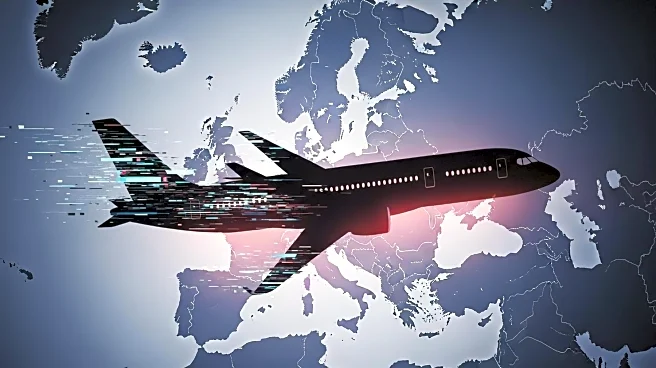What's Happening?
A cyberattack on Collins Aerospace, a software provider for check-in and boarding systems, has led to significant flight delays across major European airports. The attack, identified as a ransomware incident, disrupted operations at airports including London Heathrow, Brussels, Dublin, and Berlin. Collins Aerospace, a subsidiary of the U.S. company RTX, is working to restore full functionality. The European Union Agency for Cybersecurity confirmed the ransomware attack, which locks data and systems to demand a ransom. Airports have resorted to manual processing due to offline kiosks and bag-drop machines. Heathrow reported most flights operating normally but warned of potential delays in check-in and boarding processes. Brussels airport experienced cancellations, while Dublin airport anticipated no cancellations but remained cautious. The incident underscores the vulnerability of airports relying on external suppliers for critical technology.
Why It's Important?
The cyberattack on Collins Aerospace highlights the growing threat of ransomware to critical infrastructure, particularly in the aviation sector. This incident affects not only airport operations but also passenger travel plans, potentially leading to economic repercussions for airlines and related businesses. The reliance on external technology providers for essential services exposes airports to cybersecurity risks, emphasizing the need for robust security measures. The attack has already impacted airline stocks, with declines observed in companies like IAG, easyJet, and Wizz Air. As cyber threats become more sophisticated, the aviation industry must prioritize cybersecurity to protect against disruptions that can have widespread economic and operational consequences.
What's Next?
Collins Aerospace is in the final stages of updating its systems to restore normal operations. Airports and airlines are expected to continue manual processing until full functionality is achieved. The European Commission is monitoring the situation closely, although current signs do not indicate a severe attack. Airlines and airports may need to reassess their cybersecurity strategies and supplier dependencies to prevent future incidents. Passengers are advised to check flight statuses and adhere to recommended arrival times at airports. The incident may prompt broader discussions on cybersecurity standards and protocols within the aviation industry.
Beyond the Headlines
The cyberattack raises questions about the ethical responsibilities of technology providers in safeguarding critical infrastructure. It also highlights the potential legal implications for companies facing such attacks, including liability for disruptions and data breaches. Long-term, this incident could drive changes in industry regulations and standards, pushing for more stringent cybersecurity measures. The cultural shift towards digital reliance in aviation underscores the need for continuous innovation in security practices to protect against evolving threats.










